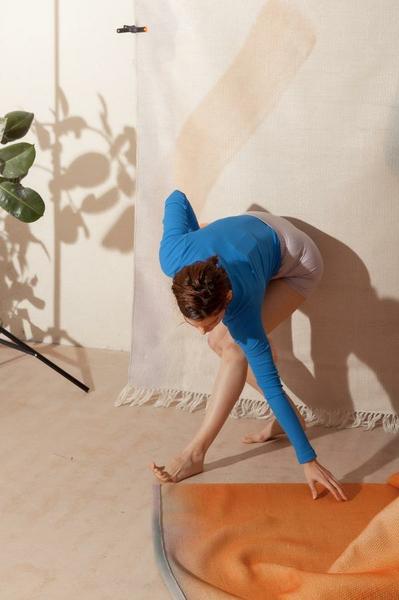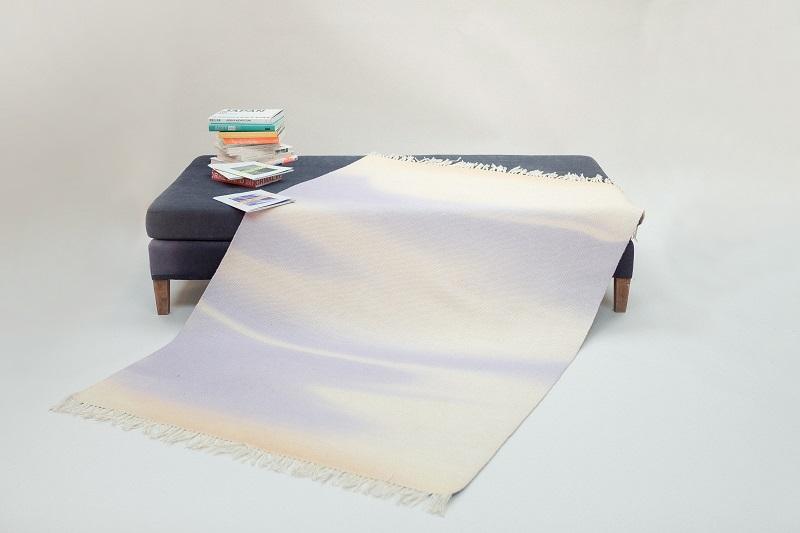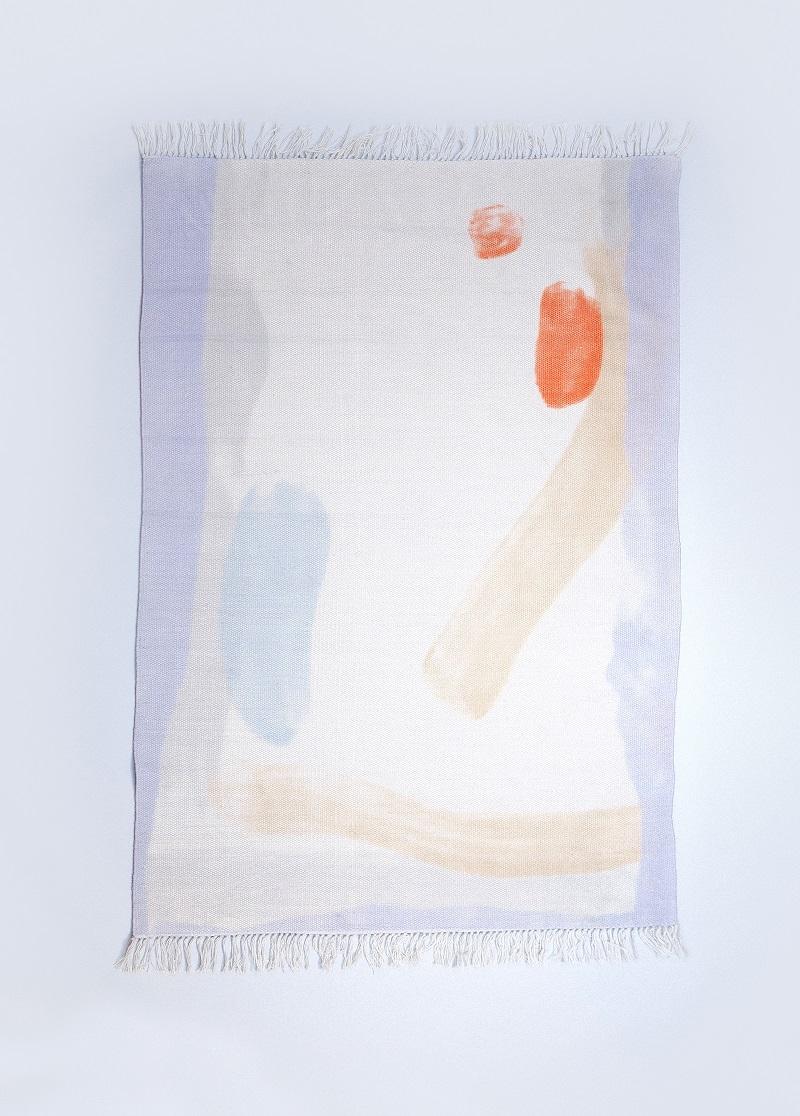
The project
Handwoven rugs made from post-consumer plastic waste, digitally printed.
THE CHALLENGE
Our fast-paced day-to-day lifestyle has disconnected us from the intrinsic value of the objects around us and how they were created.
The challenge is to find a sustainable process by using recycled materials, optimising the manufacturing process and extending the whole life cycle valuing the human and material resources that are involved in rug manufacturing to make the consumer more conscious of the processes involved.
THE SOLUTION
Revitalise traditional rug manufacturing with a new approach introducing a circular business model creating a 100% recycled polyester rug from plastic bottles. The entire rug will be made from a single material, simplifying its manufacture and waste management. Production will be more sustainable, avoiding dyeing and using instead digital printing to obtain a unique product for a unique space.
With the help of new digital printing equipment, thepartnership will:
1- Introduce colour into a textile with greater thickness.
2- Use nontoxic inks.
3- Excellent performance (outdoor).
4- Faster production.
This combination of material and process will standardise production, minimise stock and simplify distribution.
Storytelling
THE IDEA:
After several years working for leading fashion companies, I found myself lost in a deep need for meeting my own purpose and creating something meaningful, away from massive consumption: to create, aligned with conscious values and slow processes. Enhanced by my artistic background, I started imagining how to hybridise illustration with product design, which finally materialized into illustrated rugs, conceived as unique and artistic pieces. I especially remember one sunny morning. Finally I realized that this project could be my form of expression, but also because of that, a demanding path of energy and knowledge. A challenge, at that time imprecise but also motivating.As a textile graphic designer, millions of artistic references arose to my mind. I really loved the idea of reimagining the rug as a white canvas, open to crazy approaches and diagonal collaborations. It was this aim of intervening textiles in a wide graphic range that led me to consider digital printing as my innovative way to give birth to the pieces.


THE BIRTH OF THE PROJECT:
Our project was born surrounded by many questions: why another rug business? How could I make a rug with no previous experience? What do rugs represent in our daily lives? Besides all these doubts, a severe environmental crisis was (is) devastating our planet. My focus was specially on how our oceans are filled with tons of plastic waste. Fortunately, the use of new bio, organic and natural resources is increasing in the industry, especially in fashion. But still, there is a stark reality that we have to face: we are surrounded by plastic and it lasts almost forever. That problem was the final push to undertake this adventure, where a recycled polymeric fibre would be the seed to grow my white canvas. Just one recycled and recyclable monomaterial, looking to close the circle.


THE CREATIVE PROCESS:
We make rugs, but not just rugs. We make unique pieces that emanate from an original concept and aesthetic. Our project supposes the exploration of new ways of expanding graphic possibilities; it is research, dialogue and fusion between art and design. Nevertheless, the way to achieve this wasn’t always clear. Even though we knew that using recycled polymeric fibres was a good starting point, we didn’t know how the material would react with the digital printing technique, so we had to design a new process from scratch. Fortunately, our intuition guided us to achieve an innovative production that reduces water footprint ten times more than a regular process.


THE COLLABORATION:
ALLCA, our project, couldn’t be possible without this collaborative approach. Any idea could be good as a concept, but making it feasible demands a solid background, knowledge and, why not?, a lot of curiosity. We really love how the ancient know-how has merged with new aesthetics and ideas, it blends naturally and nurtures our present with continuous learning. Being a circular business, that is, being responsible for what happens to the rug once it is dismissed from the customer, is a challenge that we can only afford by sharing our different skills.


THE FUTURE:
Our idea of success is based on three crucial points.To create a circular business that’s committed with new ways of recycling, reselling, re-intervening, revolving, etc. the product. We seek to be honest and clear in terms of traceability. To engage with our customers, being able to sell on a worldwide scale, providing the best quality standards, and improving our pieces every day. To collaborate with creative minds, building our brand with an evolving approach, nurturing ourselves from the diagonal thinking involved in co-creation. Of course, we are aware of the challenges that creating a new brand entails, especially for one that has sustainability at the core of its mission. For this reason, additional support, such as mentoring programmes, networking events, promotional campaigns, etc… could not only help us improve our skills, but also find new sales and investment channels.


THE MESSAGE:
We understand collaboration as the opportunity to learn from others who you share a goal with. That means that the result is not the aim of the process, but it’s actually the process the most meaningful part itself. Learning is an attitude that’s deeply moved by knowing “the other”. Curiosity, and a will to step outside our comfort zone, to push ourselves to create; this lead us to embark on this entrepreneurial venture.The more different the background, the more interesting the approach will be.


- Project locations
- SpainGermany
- Project website
- allcarugs.com
- Projects Edition
- WORTH Partnership Projects I
- Project Call
- 2nd Call Projects
- Project Sector
- Textile - Fashion
- Project Challenge
- Circular Economy
Contact
HAIZEA NÁJERA MUÑOZ
Haizea Nájera is a textile illustrator based in Madrid.
She currently works for a kidswear brand that combines with her own line of plastic and graphic research, exploring new forms of expression and applied art.
After graduating in Fine Arts with a Design and Illustration Master’s Degree, she has focused her career on the fashion business for more than 6 years, working for leading fashion brands, trend-setting agencies and as a freelance artist.
- Name
- HAIZEA NÁJERA MUÑOZ
- Postal address
- Spain
- Social media
HAMDI YENERER
Hamdi Yenerer is the founder of CARPT, a rug design start-up company based in Stuttgart, Germany. Together with Elisabeth Kätzl (textiledesigner), they created an exclusive rug collection, aimed at Interior Designers.
Hamdi Yenerer graduated as a Business Administrator. His family has been in the carpet business for more than 50 years. Before starting his own business, he worked in a well-known textile design company. Hamdi has an in-depth knowledge of carpet manufacturing.
- Name
- HAMDI YENERER
- Postal address
- Germany
